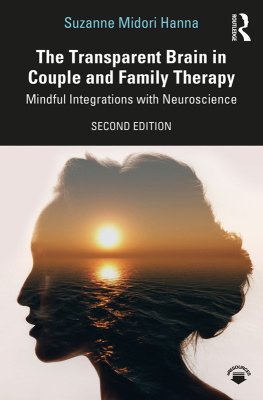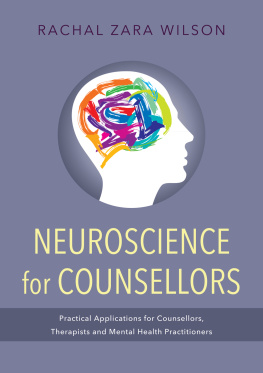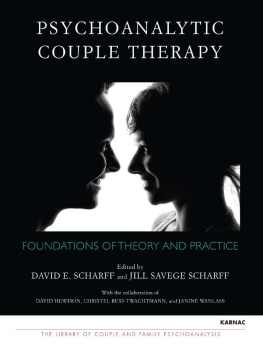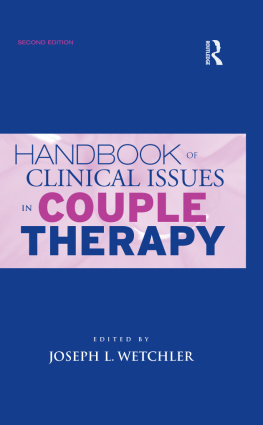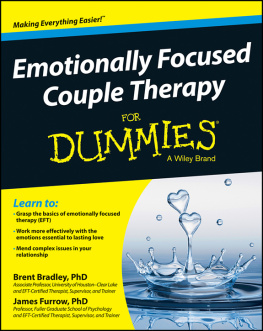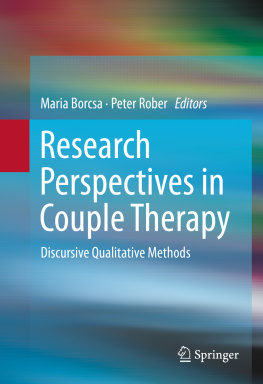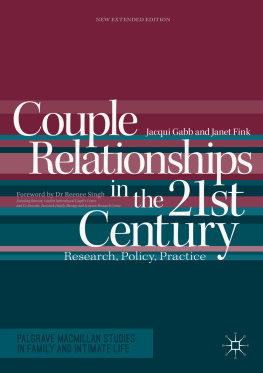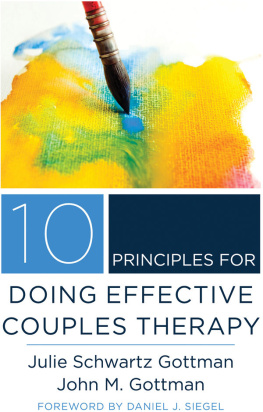Brief Couples Therapy:
Group and Individual Couple Treatment for Addiction
and Related Mental Health Concerns
Gloria Chaim, MSW
Sharon Armstrong, PhD
Joanne Shenfeld, MSW
Colleen Kelly, MSW
Selina Li, MSW

Brief Couples Therapy: Group and Individual Couple Treatment
for Addiction and Related Mental Health Concerns
National Library of Canada Cataloguing in Publication
Brief couples therapy: group and individual couple treatment
for addiction and related mental health concerns / Gloria Chaim [et al.].
Includes bibliographical references.
ISBN 0-88868-448-7
1. Substance abuseTreatment. 2. Marital psychotherapy.
I. Chaim, Gloria, 1955- II. Centre for Addiction and Mental Health.
RC564.B748 2003 616.86651 C2003-901095-3
PGII7
Printed in Canada
Copyright 2003 Centre for Addiction and Mental Health
With the exception of the handouts and progress notes, no part of this work may be reproduced or transmitted in any form or by any means electronic or mechanical, including photocopying and recording, or by any information storage and retrieval system without written permission from the publisher except for a brief quotation (not to exceed 200 words) in a review or professional work.
The handouts and progress notes may be photocopied and distributed for use with clients. This licence is limited to the individual purchaser, for use with the purchasers own clients/patients and does not extend to additional therapists or practice settings. The licence does not grant the right to reproduce these materials for sale, redistribution or any other purposes (including but not limited to books, pamphlets, articles, video or audiotapes and handouts or slides for workshops or lectures). Permission to reproduce these materials for these and other purposes must be obtained in writing from the Centre for Addiction and Mental Health.
This book was produced by:
DEVELOPMENT
Caroline Hebblethwaite, CAMH
EDITORIAL
Diana Ballon, CAMH
Sue McCluskey, CAMH
DESIGN
Nancy Leung, CAMH
PRODUCTION
Christine Harris, CAMH
MARKETING
Ronda Kellington, CAMH
For information on other Centre for Addiction and Mental Health resource materials
or to place an order, please contact:
Marketing and Sales Services
Centre for Addiction and Mental Health
33 Russell Street
Toronto, ON M5S 2S1 Canada
Tel.: 1-800-661-1111 or 416-595-6059 in Toronto
E-mail: marketing@camh.net
Web site: www.camh.net
ACKNOWLEDGMENTS
EVALUATION TEAM
Selina Li
Virginia Ittig-Deland
Sharon Armstrong
PROJECT TEAM
Gloria Chaim
Joanne Shenfeld
Selina Li
Sharon Armstrong
Colleen Kelly
Carolynne Cooper
Tony Toneatto
Virginia Ittig-Deland
Dennis Walker
FIELD TEST SITES
Centre for Addiction and Mental Health, ARF Division, Family Service (CAMH)
Addiction Services for York Region (ASYR)
North York General Hospital, Branson Division, Mental Health Outpatient Services (NYGH)
FIELD TEST PARTNERS
Pam Santon, (ASYR)
David Ravvin, (ASYR)
Lisa Freud-Goldman, (NYGH)
Genevieve McNabb, (NYGH)
REVIEWERS
Charmaine C. Williams
Clare Bowles
Darryl Upfold
David Denberg
David Ravvin
Donna Akman
Elizabeth Hendren-Roberge
Elsbeth Tupker
Farzana Doctor
Genevieve McMath
Jane Paterson
John Mancini
Lisa Freud-Goldman
Pam Santon
Paul Stebbins
Sonia Panchyshyn
Wayne Skinner
We gratefully acknowledge the generous support of the Stupp/Cohen Families Foundation and their initiative to create the Randy Stupp Fellowship at the Centre for Addiction and Mental Health.
CONTENTS
INTRODUCTION
Who Will Use This Manual?
This manual was developed primarily as a tool for therapists and counsellors working in substance use settings who would like to augment their practice by seeing couples. Clinicians intending to use this program should be familiar with solution-focused therapy, as well as couple and family therapy. Familiarity with cognitive behavioural interventions and communication theory would also be helpful.
The manual will also be useful for the practitioner who is seeing couples, and who would like to be able to offer a focused, specific program for clients presenting with substance use issues. In this situation, familiarity with cognitive behavioural therapy, relapse prevention and motivational interviewing for substance use is recommended.
CONCURRENT DISORDERS SETTINGS
Because the Brief Couples Therapy (BCT) protocol was developed and is used within a concurrent setting, we regard it as one aspect of a comprehensive approach to treatment for substance use and mental health disorders. As such, BCT focuses on substance use issues to a greater extent than on mental health issues. However, whether or not clients present themselves as suffering from concurrent disorders, therapists and counsellors will undoubtedly find themselves dealing with couples who have had to cope with depression, mania, anxiety and other mental health issues. Thus, therapists should be aware of the prevalence of concurrent disorders as described in this manual in the section Why is there a need for Brief Multiple Couple Treatment? In particular, therapists should be cognizant of the likelihood that clients may engage in their substance use or increase it when they are dealing with mental health problems such as depression, anxiety, schizophrenia and personality disorders; and on the other side of the coin, therapists ought to be aware of the possibility of the occurrence of symptoms of anxiety, depression and psychotic episodes that are tied to problem substance use.
THEORETICAL AND PHILOSOPHICAL PERSPECTIVES
It is hoped that this manual will be a useful tool for clinicians who may adhere to a variety of different philosophical and theoretical perspectives on human nature and change processes. Because the underlying conceptual model is based on an integration of theoretical principles, we believe that the techniques we are presenting are adaptable to different schools of thought. In this vein, we hope that whatever your philosophy of human nature or your theoretical perspective regarding the processes involved in counselling and therapy, you will find this a useful tool for practice. We presume that, where deemed necessary, therapists will modify the wording of checklists and exercises to suit their particular clientele, practices and philosophies.
Who Is bct For?
The clients who have engaged in the BCT treatment program, in both the individual and the group conditions, have come from a variety of backgrounds, but all of them have had problems with substance use and many have had concurrent mental health issues. Prior to being in couples treatment, the person with the substance use problem has had treatment or has met his or her personal drug-use goal, or both. This has enabled the work of the sessions to be focused on the relationship issues connected to substance use to a greater extent than on the individual clients use. Therefore, we recommend that therapists using BCT ensure either that the substance-using partner has met his or her personal substance goal and has received individual treatment or that the client is currently receiving treatment for substance use. Nevertheless, lapses during the course of this treatment, or any, may occur, and these should be dealt with during sessions in the context of their impact on partners relationships.


